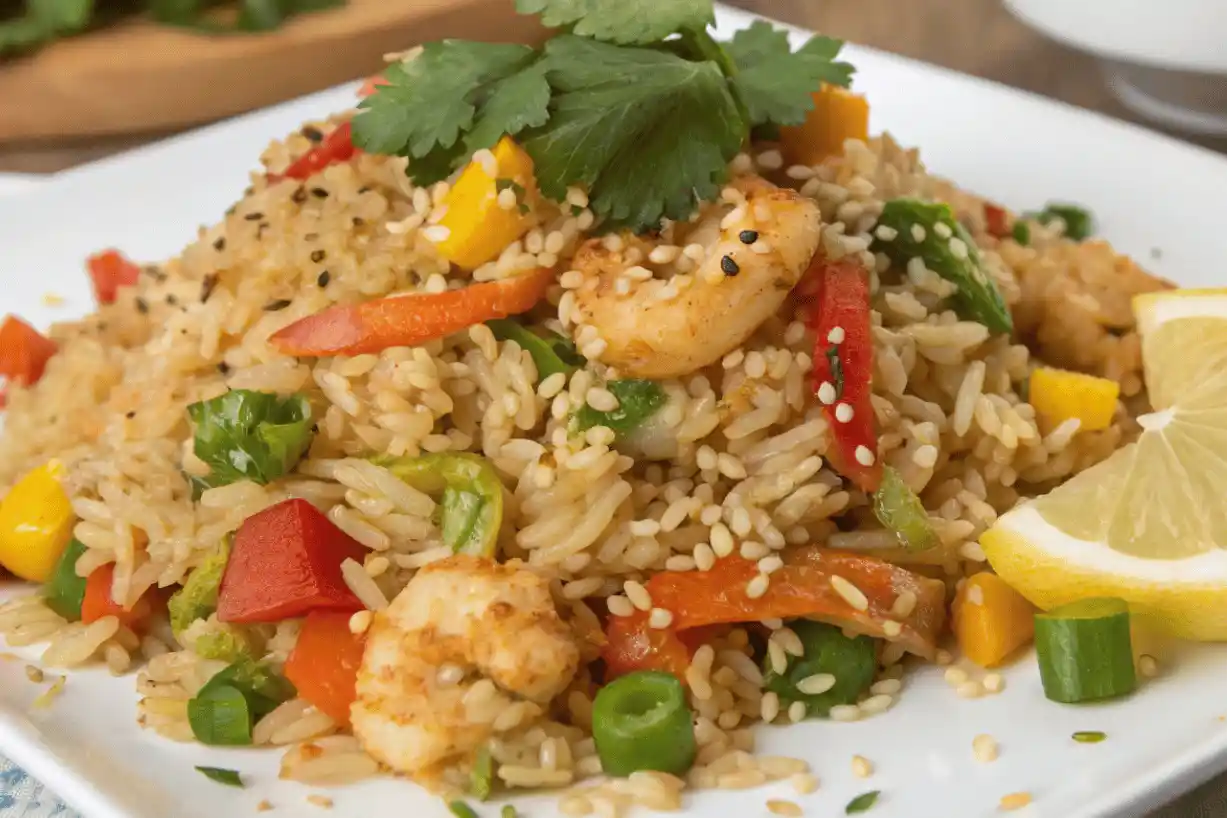Have you ever tried making fried rice at home only to end up with a sticky, soggy mess that tastes nothing like the takeout version? I’ve been there too. Years ago, I thought tossing rice in a pan with soy sauce was enough. Spoiler alert: it’s not. What I’ve learned through trial, error, and a lot of burned garlic is this, there’s a science and a rhythm to making perfect arroz frito.
This guide is not just another recipe. It’s the all-in-one playbook. You’ll find a foolproof master recipe, five authentic regional twists, professional cooking secrets, and clear answers to the most common questions. Whether you’re trying to impress someone or just fix your late-night craving, this is everything you need to get it right.
Table of Contents
The 3 Golden Rules of Authentic Arroz Frito
Before you even grab your spatula, lock these three rules into your brain. These are non-negotiable if you want fried rice that’s fluffy, flavorful, and never greasy.
Rule 1: The Rice Must Be Cold and Dry
Freshly cooked rice turns into mush. Day-old rice that’s been chilled in the fridge is ideal. It dries out just enough to stay separate when stir-fried.
Rule 2: The Heat Must Be High and Consistent
This is not the time for low and slow. You want a hot pan to instantly sear each grain and avoid any steaming. A screaming hot wok or skillet gives that slightly charred, restaurant-style taste.
Rule 3: Everything Must Be Prepped Before Cooking
Fried rice cooks fast. Chop your vegetables, beat your eggs, and measure your sauces ahead of time. The French call this “mise en place” for a reason—once the heat is on, there’s no time to pause.
Ingredients Needed
Getting great results starts with the right ingredients. Here’s everything you’ll need for the classic arroz frito, grouped by purpose to make prep easier.

For the Base:
- 3 tablespoons of cooking oil, such as vegetable or peanut oil
- 2 cups of cold steamed rice, preferably day-old and refrigerated overnight
- 5 large eggs, beaten until smooth
For the Aromatics:
- 1 bunch of green onions, sliced thinly using both the white and green parts
For the Seasoning:
- Soy sauce, added to taste depending on how salty and dark you like your rice
Cold rice is the hero here. Fresh rice holds too much moisture, which causes clumping and mushiness in the pan. Chilling it overnight helps the grains dry slightly, making them perfect for frying.
How to Make Arroz Frito (Como Fazer Arroz Frito com Ovo)
If you’ve ever wondered como fazer arroz frito com ovo (how to make fried rice with egg), here’s the simple step-by-step method. The secret is starting with cold, day-old rice and cooking quickly over high heat. Follow these steps for fluffy, flavorful, perfectly fried arroz frito.
Step 1: Heat the oil
Place a large skillet or wok over medium-high heat. Once the pan is hot, add the cooking oil. Swirl it around so the entire surface is coated.
Step 2: Cook the green onions
Toss in the sliced green onions. Stir them often and cook for about three minutes. When the white parts become soft and translucent, they’re ready. Move them to one side of the pan to keep them warm.

Step 3: Scramble the eggs
Pour the beaten eggs into the empty side of the pan. Let them sit untouched for about thirty seconds until they begin to set. Then gently stir and break them into soft curds using a spatula. Once cooked through, mix them with the green onions.
Step 4: Add the cold rice
Add the chilled rice directly into the pan. Break apart any clumps with your spatula. Stir everything together, making sure the rice mixes well with the eggs and onions. Cook for about five minutes or until the rice is hot and starting to get a bit crispy in spots.
Step 5: Season to taste

Drizzle soy sauce over the rice a little at a time. Stir and taste as you go. Keep mixing until the rice is evenly colored and seasoned to your liking. The goal is a light golden brown, not soggy.
Step 6: Serve hot
Once everything is mixed and heated through, remove from heat and serve right away. Arroz frito tastes best fresh out of the pan when it’s hot, fragrant, and slightly crispy.
If you’re planning a full meal, arroz frito makes the perfect base for bold, savory mains. Pair it with our flavorful Black Pepper Chicken for a satisfying combo that hits all the right notes tender chicken, rich sauce, and perfectly seasoned rice on the side.
The 5 Secrets to Truly Restaurant-Quality Arroz Frito
Anyone can throw rice in a pan, but real fried rice has texture, flavor depth, and that unmistakable toasty aroma. These five secrets will take your arroz frito from average to unforgettable.

Secret 1: The Science of Cold Rice
Cold rice is more than a convenience. When rice cools, its starches firm up through a process called retrogradation. This keeps the grains separate and ready to fry without clumping. If you forgot to prep rice the night before, spread freshly cooked rice on a baking sheet in a thin layer. Chill it in the fridge for at least an hour.
Secret 2: Mastering High Heat
High heat gives you more than speed. It helps evaporate surface moisture instantly, creating the slight char and smoky depth often found in restaurant versions. If you’ve ever wondered why homemade fried rice feels soft and steamed, the heat probably wasn’t high enough.
Secret 3: Seasoning in Layers
Dumping sauce at the end is a common mistake. To get deeper flavor, season ingredients as you go. Add a little soy sauce to the eggs or lightly salt the vegetables before mixing everything together. Building flavor in steps brings complexity and balance to every bite.
Secret 4: The Perfect Scrambled Egg
There are two winning methods. You can cook the eggs first, remove them, and add them back in later for clean, fluffy pieces. Or, you can push the rice to one side and scramble the eggs in the same pan before combining. Both work, but scrambling separately gives you better control over texture.
Secret 5: Don’t Crowd the Pan
Too many ingredients in the pan at once drop the temperature. Instead of frying, your rice will steam and turn soft. Give everything room to move. If needed, cook in two batches and combine them at the end. It takes a little more time but guarantees better results.
5+ Authentic Arroz Frito Variations You Must Try
One of the best parts about arroz frito is how flexible it is. These variations bring global flair and cultural depth to a basic dish, transforming it into something unique every time. Try one or all to find your favorite.
Arroz Frito con Pollo o Camarones (Chicken or Shrimp)
Key Ingredients: Thinly sliced chicken breast or peeled raw shrimp
Technique Note: Start by cooking the chicken or shrimp in a hot pan with a bit of oil. Remove once cooked through and set aside. Follow the basic recipe, then add the cooked protein back in during the final mix. This keeps the meat juicy and prevents overcooking.
Arroz Frito Cubano
Key Ingredients: Diced ham, green peas, chopped carrots
Technique Note: Cuban-style fried rice focuses on richness from the ham. Less soy sauce is used. The flavor comes from the sautéed vegetables and the salty, meaty bite of ham. This version is hearty and comforting with a touch of sweetness from the peas and carrots.
Arroz Chino Boricua (Puerto Rican Style)
Key Ingredients: Ham or jamonilla, Ajinomoto for seasoning
Technique Note: This version brings serious umami thanks to Ajinomoto. Dice the meat small for even browning. Seasoning with a pinch of MSG gives that bold flavor found in Puerto Rican-Chinese takeout spots. This version is savory, bold, and loaded with nostalgia.
Arroz Frito Vegetariano (Vegetarian Fried Rice)
Key Ingredients: Cubed firm tofu, broccoli florets, mushrooms, edamame
Technique Note: Press tofu to remove moisture, then pan-fry it until golden on all sides. Add vegetables in stages based on cooking time. This method gives you crispy tofu and tender-crisp veggies with real flavor.
Yakimeshi (Japanese-Style Fried Rice)
Key Ingredients: Japanese short-grain rice, unsalted butter, mushrooms
Technique Note: This variation is softer due to the rice’s natural stickiness. The flavor comes from butter and mushrooms, often paired with chopped scallions or pickled ginger. Stir-fry the rice with butter first to build a rich base, then add the other ingredients.
Conclusion
Now you know the full method to create arroz frito that’s full of flavor, texture, and personality. With cold rice, high heat, and the right prep, you can turn a simple dish into something unforgettable. Whether you prefer it with shrimp, tofu, or the Boricua twist, the choice is yours.
Which version will you make first? Leave a comment and a rating below. We would love to see how it turned out.
Answering Your Arroz Frito Questions (FAQ and Troubleshooting)
These are the most common questions people have about arroz frito. Clear answers here will help you avoid mistakes and cook with confidence.
What is arroz frito
Arroz frito is the Spanish name for fried rice. It typically refers to a stir-fried dish made with cold cooked rice, vegetables, protein like egg or chicken, and sauces like soy sauce. It’s a popular comfort food in many Latin American and Asian communities.
What is the name of the Chinese fried rice dish
The Chinese version of fried rice is commonly called “Chǎofàn” in Mandarin. In English or Spanish-speaking regions, it’s often referred to as Chinese fried rice or arroz chino.
What is chino rice in English
“Chino rice” is an informal name used in Latin cultures to refer to Chinese-style fried rice. In English, it’s simply called Chinese fried rice.
What does Frito mean
“Frito” means “fried” in Spanish. So, “arroz frito” directly translates to “fried rice.” The word refers to the cooking method where ingredients are quickly cooked in oil over high heat.

How to Make Perfect Arroz Frito
- Total Time: 25 minutes
- Yield: 4 servings 1x
Description
Learn how to make authentic arroz frito with crispy rice, bold flavor, and easy chef tricks. No more soggy rice just perfect fried rice every time!
Ingredients
- 3 tablespoons of cooking oil (vegetable or peanut oil)
- 2 cups of cold steamed rice, preferably day-old and refrigerated overnight
- 5 large eggs, beaten until smooth
- 1 bunch of green onions, sliced thinly (white and green parts)
- Soy sauce, to taste
Instructions
- Heat a large skillet or wok over medium-high heat and add the cooking oil, swirling to coat.
- Add the sliced green onions and cook for about 3 minutes until softened, then push to one side of the pan.
- Pour in the beaten eggs, let them sit for 30 seconds, then stir into soft curds and mix with the onions.
- Add the cold rice, breaking up clumps with a spatula and stir-fry for 5 minutes until heated and slightly crispy.
- Drizzle soy sauce a little at a time, stirring and tasting until evenly colored and seasoned to your preference.
- Remove from heat and serve hot for best texture and flavor.
Notes
Use day-old rice for ideal texture and fry on high heat for that signature wok-charred aroma.
- Prep Time: 10 minutes
- Cook Time: 15 minutes
- Category: Main Dish
- Method: Stovetop
- Cuisine: Latin American
Nutrition
- Serving Size: 1 serving
- Calories: 310
- Sugar: 1g
- Sodium: 680mg
- Fat: 14g
- Saturated Fat: 3g
- Unsaturated Fat: 10g
- Trans Fat: 0g
- Carbohydrates: 32g
- Fiber: 1g
- Protein: 12g
- Cholesterol: 190mg

